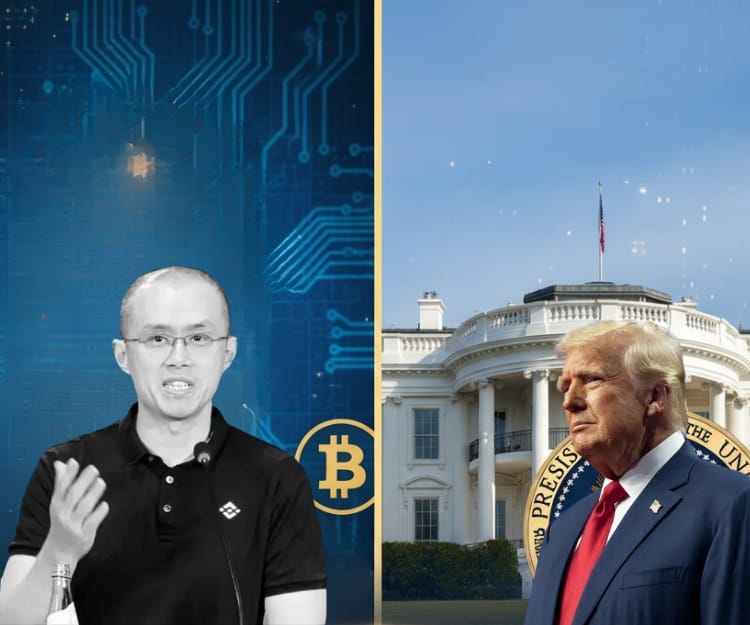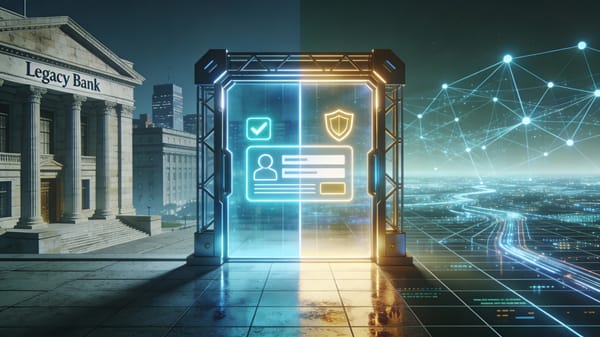Trump Pardons Binance Founder CZ: What It Means for Crypto
President Trump pardons Binance founder Changpeng Zhao, erasing his felony conviction and signaling a dramatic shift in US crypto policy. BNB rallies 7% as the industry celebrates the end of Biden-era enforcement.

In a groundbreaking move that signals a dramatic shift in U.S. cryptocurrency policy, President Donald Trump has officially pardoned Changpeng Zhao (CZ), the founder of Binance, the world's largest cryptocurrency exchange. The pardon, confirmed by White House Press Secretary Karoline Leavitt on Thursday, October 23, 2025, effectively erases Zhao's 2023 felony conviction and marks one of the most significant regulatory developments in the digital asset industry this year.
The Pardon: A Political and Legal Watershed
President Trump exercised his constitutional authority to grant clemency to Zhao, who had pleaded guilty in November 2023 to violating the Bank Secrecy Act by failing to maintain an effective anti-money laundering (AML) program at Binance. As part of a historic $4.3 billion settlement with the Department of Justice, Zhao stepped down as CEO, paid a $50 million personal fine, and served four months in federal prison in 2024.
"President Trump exercised his constitutional authority by issuing a pardon for Mr. Zhao, who was prosecuted by the Biden Administration in their war on cryptocurrency," Leavitt stated in an official White House release. "In their desire to punish the cryptocurrency industry, the Biden Administration pursued Mr. Zhao despite no allegations of fraud or identifiable victims. The Biden Administration's war on crypto is over."
According to multiple reports, Trump signed the pardon on Wednesday following months of discussions within the White House. Sources close to the matter indicated that Trump was sympathetic to arguments that Zhao faced political persecution, with financial journalist Charles Gasparino reporting that many Trump insiders believed "the fraud case against Changpeng Zhao was pretty weak, and certainly not something that merited a felony charge and jail time."
Market Reaction: BNB Surges on Historic News
The cryptocurrency market responded immediately to the pardon announcement. BNB, Binance's native token, surged approximately 7% in the hours following the news, spiking from below $1,120 to an intraday high above $1,140, according to CoinGecko data.
The rally reflects renewed confidence in Binance's ecosystem and optimism about a more favorable regulatory environment under the Trump administration. Crypto analyst Xeer tweeted: "Trump just pardoned CZ. Now we resume $BNB up only szn" - capturing the bullish sentiment sweeping through crypto trading communities.
Trading volumes surged across both spot and derivatives markets, with open interest in BNB futures increasing as traders positioned for continued upside. The price action suggests that market participants view the pardon as a catalyst that could propel BNB toward the $1,500-$2,000 range in the coming months, according to technical analysis from industry experts.
What the Pardon Means for CZ's Future
The presidential pardon effectively erases Zhao's federal conviction and restores his full civil rights. Practically, this means:
- No travel restrictions: CZ can enter the United States without the limitations typically applied to convicted felons
- Business licensing: He can apply for business licenses and regulatory approvals that require clean criminal records
- US market access: CZ can engage with US-regulated entities without triggering automatic compliance bans
- Restored civil rights: He regains voting rights and eligibility to hold executive positions in US-registered companies
However, it's important to note that while the pardon removes the criminal conviction, Binance remains under separate regulatory agreements that include binding provisions preventing Zhao from participating in the exchange's management or governance for several years. The company's 2023 plea deal with the DOJ includes court-appointed monitoring and compliance requirements that remain in effect regardless of CZ's personal legal status.
Despite these temporary restrictions, the pardon fundamentally rehabilitates Zhao's standing in global finance, potentially reopening doors to new ventures, partnerships, and advisory roles across the cryptocurrency and traditional finance sectors.
Broader Implications for Crypto Regulation
The pardon represents far more than personal clemency for one individual - it signals a fundamental shift in how the federal government approaches cryptocurrency regulation and enforcement.
A Pro-Crypto Administration
Trump's decision follows a pattern of crypto-friendly actions since his inauguration in January 2025. The administration has already:
- Pardoned Ross Ulbricht, founder of the Silk Road darknet marketplace
- Granted clemency to BitMEX co-founders
- Appointed crypto-friendly regulators to key positions, including Paul Atkins as SEC Chair
- Established a Crypto Task Force to develop clear regulatory frameworks
The White House's explicit criticism of the "Biden Administration's war on cryptocurrency" marks a rhetorical and policy departure that could reshape enforcement priorities across federal agencies, including the Securities and Exchange Commission (SEC), Commodity Futures Trading Commission (CFTC), and the Treasury Department.
Industry Response
The cryptocurrency industry has largely welcomed the development. Prominent figures across blockchain, DeFi, and traditional finance have praised the move as a step toward regulatory clarity and fairness.
The pardon also addresses concerns about "regulation by enforcement" - a strategy whereby agencies pursue legal action against crypto companies without first establishing clear rules. Many industry participants have argued that this approach stifled innovation and drove crypto businesses offshore.
Broader Market Context: A Crypto-Friendly Era
The CZ pardon arrives during a period of significant transformation across the cryptocurrency landscape:
Trump Family Crypto Ventures
According to Financial Times investigations, the Trump family has generated over $1 billion in profits from cryptocurrency ventures, including World Liberty Financial, a crypto company launched in September 2024 that features Eric and Donald Trump Jr. in leadership roles. Trump's most recent financial disclosure reveals he made more than $57 million last year from World Liberty Financial, which has launched USD1, a stablecoin pegged 1-to-1 to the U.S. dollar.
This financial involvement has raised questions about potential conflicts of interest, though the White House has maintained that Trump's pardons are based on principles of justice rather than business considerations. Nonetheless, Zhao's reported support for World Liberty Financial added complexity to the pardon discussions.
Regulatory Momentum
Beyond individual pardons, the Trump administration has signaled comprehensive regulatory reforms:
- The SEC's Crypto Task Force is developing frameworks for token classification, stablecoin regulation, and DeFi oversight
- Multiple federal agencies are coordinating to reduce duplicative enforcement and provide clearer guidance
- Congress is considering legislation to establish statutory definitions for digital assets and clarify jurisdictional boundaries between regulators
Global Competition
The favorable U.S. regulatory environment comes as international competition for crypto leadership intensifies. The European Union's MiCA framework, the United Kingdom's crypto hub initiatives, and Asian jurisdictions' progressive policies have positioned these regions as attractive destinations for crypto innovation. The Trump administration's approach appears designed to ensure the United States remains competitive in attracting blockchain companies and capital.
Risks and Considerations
While the pardon and broader regulatory developments appear positive for the industry, several risks and considerations remain:
Ongoing Compliance Requirements
Binance remains subject to extensive monitoring and compliance obligations under its 2023 settlement. The company must maintain robust AML programs, implement enhanced transaction monitoring, and submit to regular audits by an independent compliance monitor appointed by the court. Any violations of these terms could trigger additional enforcement actions regardless of CZ's personal status.
Market Volatility
Cryptocurrency markets remain inherently volatile. While BNB rallied on the pardon news, the token has experienced significant price swings in 2025, including a sharp correction in early October. Regulatory developments alone cannot eliminate market risks associated with speculative trading, macroeconomic conditions, and technological vulnerabilities.
Political Uncertainty
Regulatory policy can shift with changes in administration. While the current environment appears favorable, future elections could bring different approaches to cryptocurrency oversight. The industry must continue building sustainable business models rather than relying solely on friendly political winds.
Concentration Risks
The focus on high-profile figures like CZ and major platforms like Binance can obscure systemic issues in the crypto ecosystem. Concerns about market manipulation, exchange security, stablecoin reserves, and consumer protection remain relevant regardless of individual pardons or regulatory shifts.
What's Next for the Crypto Industry
The CZ pardon represents a pivotal moment, but it's just one chapter in the evolving story of cryptocurrency regulation and adoption. Key developments to watch include:
- Altcoin ETF Decisions: The SEC's approach to altcoin ETF applications could set precedents for investment products beyond Bitcoin and dramatically expand institutional participation across various digital assets.
- Legislative Action: Congressional efforts to pass comprehensive crypto legislation could provide the statutory clarity the industry has long sought.
- DeFi Regulation: How regulators approach decentralized finance protocols, which operate without central intermediaries, remains one of the most complex policy challenges.
- Stablecoin Framework: With multiple stablecoins now circulating and payment volumes exceeding $19.4 billion year-to-date in 2025, establishing clear rules for these dollar-pegged tokens is essential.
- International Coordination: As crypto operates globally, coordination between U.S. regulators and their international counterparts will shape cross-border enforcement and market access.
Conclusion: A Turning Point for Digital Assets
President Trump's pardon of Changpeng Zhao marks more than the end of one individual's legal troubles - it symbolizes a fundamental shift in how the U.S. government approaches cryptocurrency regulation. The explicit rejection of "regulation by enforcement," combined with concrete steps toward establishing clear frameworks, suggests a new era for digital assets.
For BNB holders and Binance users, the pardon removes uncertainty and potentially opens paths for expanded U.S. operations and continued ecosystem growth. For the broader crypto industry, the message is clear: the United States is repositioning itself as a welcoming jurisdiction for blockchain innovation.
However, this optimism must be tempered with realistic assessment of ongoing challenges. Compliance requirements remain stringent, market volatility persists, and technological and security risks continue to evolve. The industry's long-term success will depend not merely on favorable political treatment but on building robust, transparent, and sustainable businesses that deliver real value to users and society.
As crypto enters this new phase of regulatory clarity and institutional acceptance, stakeholders across the ecosystem - from developers and entrepreneurs to investors and policymakers - must work collaboratively to ensure that innovation flourishes while protecting consumers and maintaining market integrity.
The pardon of CZ may well be remembered as the moment when U.S. crypto policy turned a corner, but the ultimate destination depends on the choices and actions taken in the months and years ahead.
Sources
- Fortune - White House pardons billionaire crypto exec Changpeng Zhao
- CNBC - Trump pardons convicted Binance founder Changpeng Zhao
- CoinDesk - U.S. President Donald Trump Pardons Binance Founder CZ
- The Wall Street Journal - Trump Pardons Binance Founder
- The Block - President Trump pardons former Binance CEO Changpeng Zhao
- U.Today - BREAKING: Binance's CZ Pardoned
- CoinGape - Breaking: Trump Pardons Binance's Changpeng "CZ" Zhao, BNB Spikes
- BeInCrypto - Trump Officially Pardons CZ – Is He Returning To Binance?
- Department of Justice - Binance and CEO Plead Guilty to Federal Charges
- Binance Official Website
DISCLAIMER
This newsletter is for informational purposes only and does not constitute investment advice, advertising, or a recommendation to buy, sell, or hold any securities. This content is not sponsored by or affiliated with any of the mentioned entities. Investments in cryptocurrencies or other financial assets carry significant risks, including the potential for total loss, extreme volatility, and regulatory uncertainty. Past performance is not indicative of future results. Always consult a qualified financial professional and conduct thorough research before making any investment decisions.



